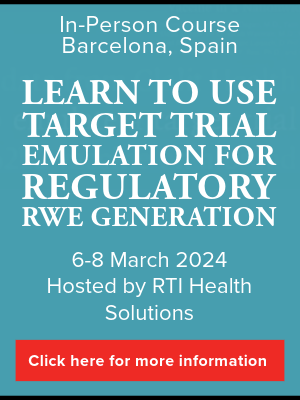By Julia Vila Guilera, PhD, and Xabier Garcia de Albeniz Martinez, MD, PhD
As the availability of real-world data grows, opportunities to leverage it are growing
Healthcare professionals, policy makers, and patients need robust evidence on the effects of healthcare interventions to make informed decisions. Causal inference is the scientific process that determines the effect of different courses of action. When applied to pharmacoepidemiology, researchers can estimate which treatments are helpful or harmful.
Randomized Clinical Trials
Randomized clinical trials are the gold standard to estimate causal treatment effects because randomization ensures that the groups being compared are equal (on average) on every aspect except for the treatment under study. Thus, any observed differences in outcomes can be attributed to the treatment. Unfortunately, in practice, randomized trials are often not feasible, timely, or ethical (e.g., think of randomizing people to receiving a potentially life-saving treatment or not when no other options are available). In these instances, real-world data (RWD) such as electronic medical records can be leveraged to answer causal inference questions by comparing groups who naturally receive different treatments.

Avoiding Bias
However, when using RWD to answer causal questions, there are several potential sources of bias that require careful consideration. This is where the target trial emulation framework becomes useful. This framework has two steps. The first step is specifying the research question by designing the hypothetical randomized trial that would answer it (the target trial). The second step is emulating the target trial using RWD and proper epidemiological methods. By explicitly stating the causal question in the form of a target trial and comparing well-defined courses of action, the framework eases discussions on the study design among stakeholders. Additionally, it helps avert biases that arise from mishandling the start of follow-up in RWD studies.
The framework has allowed results from observational analyses and randomized clinical trials to be reconciled on occasions when they were discrepant. It was used as the methodological framework of choice to generate evidence on the safety and efficacy of COVID-19 vaccines early in the pandemic, when some special populations (e.g., pregnant women) were underrepresented in randomized clinical trials and robust information on rare adverse events was lacking.
As the availability of real-world data expands, the opportunities to leverage it to make causal inferences are growing. The target trial emulation framework helps us harness real-world evidence for informed healthcare decisions.
